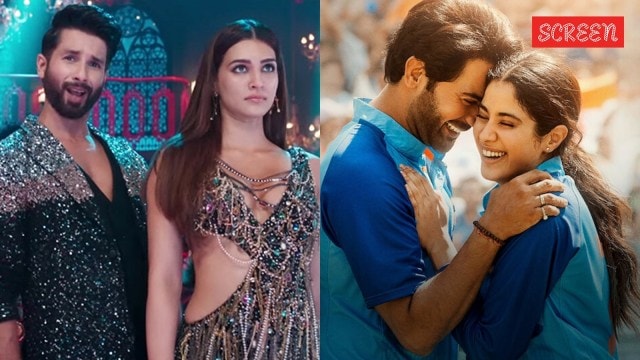‘What do we do now?’ Ten years ago, Reese Witherspoon gave a powerful speech at an event where she pointed out that in most popular films, at a critical juncture in the plot, a breathless and confused-looking woman turns to a man and asks him, “What do we do now?” Reese pointed out that this idea that a woman wouldn’t know how to handle a crisis was completely bizarre but she noticed that no one in Hollywood cared enough and they didn’t mind presenting women as distressed damsels. Drilling this idea into the audience’s head that a woman is helpless and wouldn’t know how to fend for her survival seems to have worked for Hollywood and Bollywood, is no different. In the last few years, there has been a resurgence of those retro masala action films which revolve around the hero. The hero is a god in this universe but the women around him come across as purely incidental.

A glance at a poster of any of the aforementioned films will tell you that female characters can easily be removed from this universe, and the film will go on just as smoothly. And then, there are those films where top actresses claim equal real estate on the poster, have the same amount of screen time as the man, but they are presented in a highly regressive fashion. In the last couple of years, films like Teri Baaton Mein Aisa Uljha Jiya, Mr and Mrs Mahi, Bawaal, Satyaprem Ki Katha have all been promoted as love stories (with some or the other twist), but all these films have a fundamental problem at their core – all of them see women as lesser beings.
Story continues below this ad
ALSO READ | Can realistic-looking women in Bollywood please stand up?
The morally questionable Teri Baaton Mein Aisa Uljha Jiya
 Kriti Sanon and Shahid Kapoor in Teri Baaton Mein Aisa Uljha Jiya.
Kriti Sanon and Shahid Kapoor in Teri Baaton Mein Aisa Uljha Jiya.
Shahid Kapoor and Kriti Sanon-starrer Teri Baaton Mein Aisa Uljha Jiya was presented as a love story between a man and a ‘woman’, who is actually a robot. As you watch him supposedly falling in love with her, you realise that he probably loves her because she can’t say no to him. She is a robot who just says ‘yes’. She is a ‘woman’ who is designed to obey his commands, and does not have the capacity to argue with him. There is no question of consent or conflict because she does everything he asks. At this point, you wonder if this is even a ‘love story’ or you are watching a man with a Siri-like human doll. But the film never addresses the psychology of a man who actively chooses to have a slave that serves him round the clock and is always there to inflate his ego. The film, very bluntly, literally kills the ‘woman’ the moment she starts disobeying. The filmmakers chose to present the robot in a woman’s form, even though this could have been a man, but perhaps, it was some sort of fantasy of theirs that was being fulfilled to have a woman around who would just never say no.
Satyaprem Ki Katha, where Katha becomes the bystander in her story
In Satyaprem Ki Katha, starring Kartik Aaryan and Kiara Advani, where the woman says no to physical intimacy to her newly wedded husband, people started applauding the ‘wokeness’ of the male character who understood the basics of a consensual relationship. It was almost as if people were so overwhelmed by his understanding of consent that they chose to look away when he appointed himself as her saviour. Satyaprem (Sattu), played by Kartik, is an unemployed man who somehow gets married to Katha, played by Kiara. As soon as she confides in him that she has been sexually assaulted in the past, he decides that he has to ‘save her’. Sattu announces in a huge family gathering that Katha was raped, and she looks at him shell-shocked. In his opinion, this is how she should deal with her fear but he never bothers to ask how she feels about it. He even decides the legal course that Katha must take without checking with her. The film constantly corners Katha and talks about her like she is not even in the room, just so it can portray Sattu as a saviour. The title of the film itself announces that Katha belongs to Satyaprem, as if she is no one in this universe without him.
ALSO READ | Satyaprem Ki Katha: Kiara Advani-Kartik Aaryan’s film is just as bizarre as Bawaal, so why did you give it a free pass?
Story continues below this ad
 Shraddha Kapoor in Stree 2.
Shraddha Kapoor in Stree 2.
‘Stree kuch bhi kar sakti hai?’ No
In a universe where we are told ‘Voh stree hai, voh kuch bhi kar sakti hai (She is a woman, she can do anything)’, you find out that she is just as powerless as any other film. Stree 2, starring Shraddha Kapoor in the titular role, builds itself up as the story where the woman is the supreme being. She even tries to save the day but in the end, it is Rajkummar Rao’s Vicky who has to be trained to save everyone because her powers are just not enough. She is an immortal mythical being but she is shown to be less powerful than a regular human man. Here, it feels like the filmmakers are having their cake and eating it too. They get to have a film which appears to have a strong female protagonist but ultimately, they are making a film where a woman dances to “Aaj Ki Raat” while trying to lure the male monster.
The doctor Mrs married to a man-child Mr
This idea of a woman who can do everything is terribly misrepresented in a film like Mr and Mrs Mahi, starring Janhvi Kapoor and Rajkummar Rao. The Mrs in the title is a doctor who must have spent decades studying but the Mr swoops in and tells her to give it all up so he can coach her to be a cricketer. He doesn’t care if she works as a doctor or a cricketer, he just wants a project for himself that can get him some glory, and in this attempt, she becomes the collateral damage. The film refuses to acknowledge his manipulation and gaslighting behaviour and somehow tries to make us believe what we are watching is a ‘love story’ of some kind. At one point, the Mr convinces her that studying medicine was her dad’s dream and not hers, and she should instead follow the path he is showing her, and like a lost lamb, she starts following him around.
ALSO READ | In Mr and Mrs Mahi, Rajkummar Rao plays a red flag who is worse than Kabir Singh
The ‘bawaal’ of a love story in Auschwitz
This idea of a lost lamb following around the man in her life is repeatedly pushed into our film’s narratives. A film like Bawaal chooses to tell its story through Varun Dhawan’s Ajju and not through Janhvi Kapoor’s Nisha. The film is presented as a ‘love story’ with a questionable World War II backdrop, and you wonder why a sorted woman like her is being made to spend time with him. He rejects for being lesser than him because of her medical condition but the film somehow makes it her job to turn him into a better person. It’s as if she has been given homework she never asked for and now, she has to do his homework as well.
Story continues below this ad
In most of these films, men are excessively problematic, to a degree that you wonder if the people making this film find this behaviour to be normal and the women are constantly put down making you wonder why the leading actresses are okay playing them. It is repeatedly highlighted that it is a man-woman relationship, and in that order.



 Kriti Sanon and Shahid Kapoor in Teri Baaton Mein Aisa Uljha Jiya.
Kriti Sanon and Shahid Kapoor in Teri Baaton Mein Aisa Uljha Jiya.































